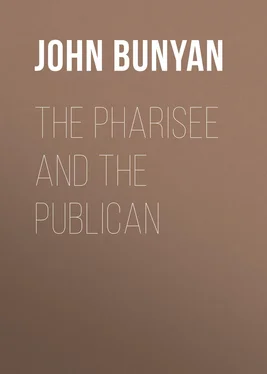John Bunyan - The Pharisee and the Publican
Здесь есть возможность читать онлайн «John Bunyan - The Pharisee and the Publican» — ознакомительный отрывок электронной книги совершенно бесплатно, а после прочтения отрывка купить полную версию. В некоторых случаях можно слушать аудио, скачать через торрент в формате fb2 и присутствует краткое содержание. Жанр: foreign_prose, foreign_religion, Философия, foreign_psychology, foreign_antique, на английском языке. Описание произведения, (предисловие) а так же отзывы посетителей доступны на портале библиотеки ЛибКат.
- Название:The Pharisee and the Publican
- Автор:
- Жанр:
- Год:неизвестен
- ISBN:нет данных
- Рейтинг книги:4 / 5. Голосов: 1
-
Избранное:Добавить в избранное
- Отзывы:
-
Ваша оценка:
- 80
- 1
- 2
- 3
- 4
- 5
The Pharisee and the Publican: краткое содержание, описание и аннотация
Предлагаем к чтению аннотацию, описание, краткое содержание или предисловие (зависит от того, что написал сам автор книги «The Pharisee and the Publican»). Если вы не нашли необходимую информацию о книге — напишите в комментариях, мы постараемся отыскать её.
The Pharisee and the Publican — читать онлайн ознакомительный отрывок
Ниже представлен текст книги, разбитый по страницам. Система сохранения места последней прочитанной страницы, позволяет с удобством читать онлайн бесплатно книгу «The Pharisee and the Publican», без необходимости каждый раз заново искать на чём Вы остановились. Поставьте закладку, и сможете в любой момент перейти на страницу, на которой закончили чтение.
Интервал:
Закладка:
4. We come, in the next place, to the ground of all this, and that is, to what the Pharisee had attained; to wit, that he was no extortioner, no unjust man, no adulterer, nor even as this Publican, and for that he fasted twice a-week, and paid tithes of all that he possessed. So that you see he pretended to a double foundation for his salvation, a moral and a ceremonial one; but both very lean, weak, and feeble: for the first of his foundation, what is it more, if all be true that he saith, but a being removed a few inches from the vilest men in their vilest actions? a very slender matter to build my confidence for heaven upon.
And for the second part of his ground for life, what is it but a couple of ceremonies, if so good? the first is questioned as a thing not founded in God’s law; and the second is such, as is of the remotest sort of ceremonies, that teach and preach the Lord Jesus. But suppose them to be the best, and his conformity to them the thoroughest, they never were ordained to get to heaven by, and so are become but a sandy foundation. But any thing will serve some men for a foundation and support for their souls, and to build their hopes of heaven upon. I am not a drunkard, says one, nor a liar, nor a swearer, nor a thief, and therefore I thank God, I have hopes of heaven and glory. I am not an extortioner, nor an adulterer; not unjust, nor yet as this Publican; and therefore do hope I shall go to heaven. Alas, poor men! will your being furnished with these things save you from the thundering claps and vehement batteries that the wrath of God will make upon sin and sinners in the day that shall burn like an oven? No, no; nothing at that day can shroud a man from the hot rebukes of that vengeance, but the very righteousness of God, which is not the righteousness of the law, however christened, named, or garnished with all the righteousness of man.
But, O thou blind Pharisee! since thou art so confident that thy state is good, and thy righteousness is that that will stand when it shall be tried with fire (1 Cor. iii. 13), let me now reason with thee of righteousness. My terror shall not make thee afraid; I am not God, but a man as thou art; we both are formed out of the clay.
First , Prithee, when didst thou begin to be righteous? Was it before or after thou hadst been a sinner? Not before, I dare say; but if after, then the sins that thou pollutedst thyself withal before, have made thee incapable of acting legal righteousness: for sin, where it is, pollutes, defiles, and makes vile the whole man; therefore thou canst not by after acts of obedience make thyself just in the sight of that God thou pretendest now to stand praying unto. Indeed thou mayst cover thy dirt, and paint thy sepulchre; for that acts of after obedience will do, though sin has gone before. But, Pharisee, God can see through the white of this wall, even to the dirt that is within: God can also see through the paint and garnish of thy beauteous sepulchre, to the dead men’s bones that are within; nor can any of thy most holy duties, nor all when put together, blind the eye of the all-seeing Majesty from beholding all the uncleanness of thy soul (Matt. xxiii. 27.) Stand not therefore so stoutly to it, now thou art before God; sin is with thee, and judgment and justice is before him. It becomes thee, therefore, rather to despise and abhor this life, and to count all thy doings but dross and dung, and to be content to be justified with another’s righteousness instead of thy own. This is the way to be secured. I say, blind Pharisee, this is the way to be secured from the wrath which is to come.
There is nothing more certain than this, that as to justification from the curse of the law, God has rejected man’s righteousness, for the weakness and unprofitableness thereof, and hath accepted in the room of that the glorious righteousness of his Son; because indeed that, and that only, is universal, perfect, and equal with his justice and holiness. This is in a manner the contents of the whole Bible, and therefore must needs be more certainly true. Now then, Mr Pharisee, methinks, what if thou didst this, and that while thou art at thy prayers, to wit, cast in thy mind what doth God love most? and the resolve will be at hand. The best righteousness, surely the best righteousness; for that thy reason will tell thee: This done, even while thou art at thy devotion, ask thyself again, But who has the best righteousness? and that resolve will be at hand also; to wit, he that in person is equal with God, and that is his in Jesus Christ; he that is separate from sinners, and made higher than the heavens, and that is his Son Jesus Christ; he that did no sin, nor had any guile found in his mouth; and there never was any such he in all the world but the Son of God, Jesus Christ.
Now, Pharisee, when thou hast done this, then, as thou art at thy devotion, ask again, But what is this best righteousness, the righteousness of Christ, to do? and the answer will be ready. It is to be made by an act of the sovereign grace of God over to the sinner that shall dare to trust thereto for justification from the curse of the law. “He is made unto us of God, righteousness.” “He hath made him to be sin for us, who knew no sin; that we might be made the righteousness of God in him.” “For Christ is the end of the law for righteousness to every one that believeth;” 1 Cor. i. 30; 2 Cor. v. 21; Rom. x. 4.
This done, and concluded on, then turn again, Pharisee, and say thus with thyself—Is it most safe for me to trust in this righteousness of God, this righteousness of God-man, this righteousness of Christ? Certainly it is; since, by the text, it is counted the best, and that which is best pleaseth God; since it is that which God hath appointed, that sinners shall be justified withal. For “in the Lord have we righteousness” if we believe: and, “in the Lord we are justified, and do glory;” Isa. xlv. 24, 25.
Nay, Pharisee, suppose thine own righteousness should be as long, as broad, as high, as deep, as perfect, as good, even every way as good, as the righteousness of Christ; yet since God has chosen, by Christ, to reconcile us to himself, canst thou attempt to seek by thy own righteousness to reconcile thyself to God, and not attempt (at least) to confront this righteousness of Christ before God; yea, to challenge it by acceptance of thy person contrary to God’s design?
Suppose, that when the king has chosen one to be judge in the land, and has determined that he shall be judge in all cases, and that by his verdict every man’s judgment shall stand; I say, suppose, after this, another should arise, and of his own head resolve to do his own business himself. Now, though he should be every whit as able, yea, and suppose he should do it as justly and righteously too, yet his making of himself a judge, would be an affront to the king, and an act of rebellion, and so a transgression worthy of punishment.
Why, Pharisee, God hath appointed, that by the righteousness of his Son, and by that righteousness only, men shall be justified in his sight from the curse of the law. Wherefore, take heed, and at thy peril, whatever thy righteousness is, confront not the righteousness of Christ therewith. I say, bring it not in, let it not plead for thee at the bar of God, nor do thou plead for that in his court of justice; for thou canst not do this and be innocent. If he trust to his righteousness, he hath sinned, says Ezekiel. Mark the text, “When I shall say to the righteous, that he shall surely live; if he trust to his own righteousness, and commit iniquity, all his righteousness shall not be remembered: but for his iniquity that he hath committed, he shall die for it;” Ezek. xxxiii. 13.
Observe a few things from this text; and they are these that follow.
1. Here is a righteous man; a man with whom we do not hear that the God of heaven finds fault.
Читать дальшеИнтервал:
Закладка:
Похожие книги на «The Pharisee and the Publican»
Представляем Вашему вниманию похожие книги на «The Pharisee and the Publican» списком для выбора. Мы отобрали схожую по названию и смыслу литературу в надежде предоставить читателям больше вариантов отыскать новые, интересные, ещё непрочитанные произведения.
Обсуждение, отзывы о книге «The Pharisee and the Publican» и просто собственные мнения читателей. Оставьте ваши комментарии, напишите, что Вы думаете о произведении, его смысле или главных героях. Укажите что конкретно понравилось, а что нет, и почему Вы так считаете.












